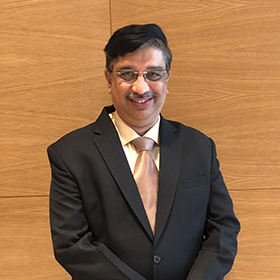Employee perspectives - Suhas Cholkar
I work in the engineering industry to build strong relationships.

In today's business landscape, the key to staying productive and gaining a competitive edge lies in the ability to forge meaningful relationships, not only with customers but also with employees. Building strong connections fosters loyalty, satisfaction and advocacy, and a business' relationship with its employees is what nurtures creativity, motivation, collaboration and a positive work culture.
Here, Suhas Cholkar, Director and Head of Manufacturing Services Division India at Renishaw, explains how engineering businesses can build a culture around great relationships.
Currently, India's engineering industry is pushing for more growth, particularly in semiconductor manufacturing. According to the International Monetary Fund (IMF), India is expected to grow at an average rate of 6.1 per cent over the next five years. It is estimated to be one of the fastest growing economies in 2023, and the government is working to help businesses grow and thrive in the region. Engineers are frontrunners in helping grow the economy, designing unique solutions to overcome complex projects. To do this, engineers need a level of freedom and flexibility to experiment with several options. When engineers have the freedom to explore different approaches and ideas, they can come up with tailored solutions that facilitate growth.
For example, being given creative freedom during my career has been integral when leading on projects ― I held a lot of responsibility when developing our Indian office, with full confidence from the senior team. The trust given to employees helps them see the impact of their work on the wider team and motivates them to perform at their best.
Continuous improvement
In addition to trust, nurturing skills and encouraging continuous development is key to keeping engineers motivated and inspired to innovate. It's more than just focusing on the quantity of their work. For semiconductor manufacturing, for example, meeting customer lead-time expectations while maintaining product quality is crucial. To do so, the freedom to create solutions helps form adaptable teams that can react quickly to changing market needs. To help engineers meet customers' demands, businesses must promote a good learning environment so that employees are continuously looking to improve and learn new things, from being trained on new technology to keeping up to date on best practice.
While there is pressure working in the high precision industry, many feel it offers a higher job satisfaction, especially when seeing your solution provide customers with faster, more accurate results compared to their previous methods. Renishaw is always embracing change and adapting to industry demands, so it's great to see how our contribution can better society, whether it's tackling climate change, broadening STEM (science, technology, engineering and mathematics) outreach or seeing our solutions offer a lending hand to innovation.
Understanding the market
Communication to both customers and employees is hugely important. When I first started in the Renishaw India team, for example, there was only a small group of us, so we all pitched in and helped one another whenever we could. For small teams like ours that work in a large organisation, feeding information from the top down is crucial so that everyone is working towards the same goal and objective. Engineering is all about creating solutions to complex issues, so customer solutions should be shared across teams to help improve business-wide customer service.
In my experience, good communication and building relationships is often one of the most important parts of engineering. By taking the time to speak to customers, engineers can develop a deep understanding of their needs, challenges and preferences, helping to design and deliver better solutions.
Every business believes its products are good and can help a lot of people, but the key to successful, long-lasting relationships is understanding what the customer actually needs. Identifying pain points and areas where engineers can deliver most value ensures they provide the best advice, and that can only be done with clear, regular communication. Day-to-day, businesses deal with people, not machines, so ensuring people feel listened to and respected is the key to success.
For businesses looking for long-term success and growth, building relationships with both customers and employees is vital. This leads to increased customer loyalty, higher customer satisfaction, improved employee engagement, enhanced collaboration and innovation, a positive brand reputation, and greater adaptability. For Indian businesses in particular, fostering a strong sense of trust will make it easier to navigate transitions and challenges in a growing economy, emerging as an adaptable and resilient organisation.
Biography
- Studied a masters degree in management science
- Joined Renishaw in 2005 as a Purchasing Manager
- Currently responsible for looking after Renishaw's Manufacturing Services Division in India
- Prior to Renishaw, Suhas had 14 years' experience in purchasing and vendor development